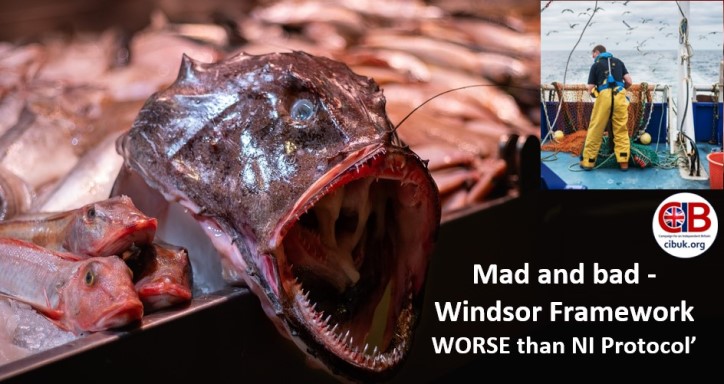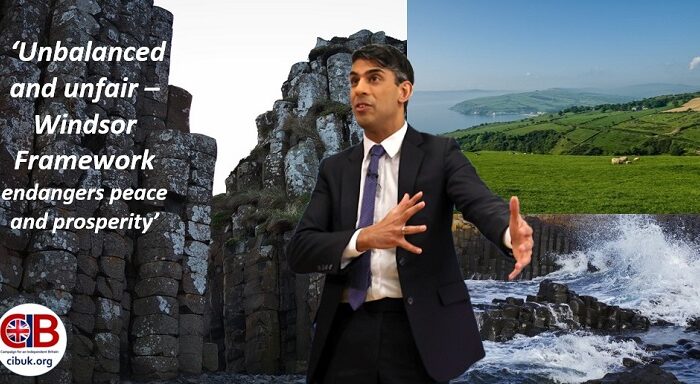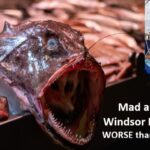‘Mad and bad – Windsor Framework WORSE than NI Protocol’

With every passing hour, the Prime Minister’s famous Windsor Framework seems to get worse
Though the vote in favour of the Prime Minister’s deal passed comfortably on Wednesday afternoon, the gaping constitutional and practical anomalies in the Protocol Bill will surely come back to haunt present and future administrations further down the line.
One particular example concerns the landing rights of Northern Ireland’s fishermen who are not allowed to land their catches in their own ports without being treated as a third country. In fundamental respects, concludes the author, the Windsor Framework is actually worse than the Protocol it is designed to replace.
We are grateful to Brian Monteith, Director of Communications at Global Britain, for permission to re-produce his article which we publish in full below.
The Windsor Framework
guts fishermen’s hopes of Protocol respite
By Brian Monteith
I HAVE PREVIOUSLY written on the wide range of mad and bad practicalities of the NI Protocol. Possibly the most absurd is that boats leaving Northern Irish harbours such as the Kilkeel fleet are, under the Protocol, not allowed to land their legitimate catches in their own ports without being treated as foreign vessels and having to complete paperwork and submit veterinary certificates.
Northern Irish fishing boats can go to Fleetwood in England or Troon in Scotland and land some of their catch, such as prawns, the processing is (unsurprisingly) located back at their home ports. If they landed in England or Scotland the processing would end up migrating by chilled haulage back there (and still face the costly bureaucratic burdens).
To see if the much-hailed Windsor Framework might have changed anything for the better I contacted Alan McCulla, the CEO of the Anglo-North Irish Fish Producers Organisation (ANIFPO).
I’ll let him explain the outcome in his own words; Alan told me:
“For our fishing industry it starts at sea, harvesting seafood from the Irish Sea, before landing it into home ports where it is processed and packed for export across the UK and beyond.
“The problems with the Withdrawal Agreement and Protocol starts at sea.
“1. From 1 January 2021 NI trawlers were excluded from Irish/EU waters, where a significant amount of fishing effort was exercised, in particular by the Kilkeel fleet. To reflect the historic nature of the Voisinage Agreement the UK, EU and Ireland did reach an agreement allowing access to Irish waters between 0 and 6 miles to vessels from both north and south.
However, access to important fishing grounds between 6 and 12 miles remained prohibited. (Access for EU vessels to the 6-12 mile zone around the south coast of England is permitted, as it is (ironically) for Crown dependencies including the Isle of Man to Irish waters in the Irish Sea! Meetings with DEFRA and the EC confirmed this issue might only be resolved if the Withdrawal Agreement was reopened.
“As we understand it the Windsor Framework did reopen the Withdrawal Agreement, but yet again the UK authorities failed to resolve this ‘oversight’ (as they described it 2 years ago).
“So for the fishing fleet the hard sea border has not been removed.” (My emphasis).
“2. Whilst disguised by the grace periods full implementation of the Protocol would require Northern Ireland trawlers to act as though they were coming from a third country every time they enter their home ports to land seafood. A unilateral declaration by the UK said this would not be enforced for the foreseeable future.
DEFRA advised this anomaly would be resolved via the Joint Committee. It was not. DEFRA has confirmed that the Windsor agreement does not resolve the issue, BUT there is an understanding that the EC will not challenge the UK’s interpretation. Action speaks louder than warm words.
“So the danger persists that NI trawlers landing their catch into their home ports in NI will have to act as though they are foreigners.” (My emphasis)
“3. When our seafood is landed employment is created to process, pack and export it. With scampi products local landings are augmented by landings brought here [to Northern Ireland] from GB. 100% of this product is primary processed in NI before it is returned to GB to be finished. Under the Protocol all seafood brought to NI from GB has been subject to additional and costly veterinary checks, which had caused supply chain delays.
As we understand it the latest agreement has not resolved this, with sources stating that by-products from the primary processing do end up in the Republic, putting at risk bio-security in the EU.
“The Windsor Framework does not resolve the additional bureaucracy, costs and delays associated with bringing seafood to NI from GB.” (My emphasis).
In short, the Windsor Framework is a fraud.
For the fishermen and fish processors of Northern Ireland the imposition of a border continues – despite regular claims to the contrary by Northern Irish Ministers, the Prime Minister or the Foreign Secretary. If the Windsor Framework becomes adopted EU law will be applied – meaning there can be no UK grace periods to disapply the Protocol’s regulatory processes – because they will now be governed by EU laws rather than the previous UK laws.
In reality, then, the Windsor Framework is actually WORSE than the NI Protocol. The UK Government is in denial about what it is doing to Northern Irish fishermen and their communities and any MP supporting the Framework is complicit in this fraudulent exercise.
By Brian Monteith, for Global Britain, 22 March 2023
About the Author: Brian Monteith is a former member of the European and Scottish parliaments, he is Director of Communications at Global Britain and editor of ThinkScotland.org.
The original article can be found here.
CIBUK thanks its Affiliated Organisation Global Britain for permission to republish this article.
Please support our work today, to keep us going
Main image: montage CIBUK.Org




